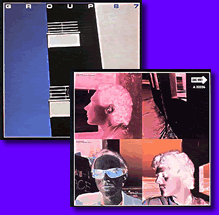|
|
|||
 conducted by Robert Silverstein for mwe3.com |
GROUP
87 |
||
|
|
|||
|
Part 2 Mark
Isham (MI) RS: By the way, I always wanted to know how you came up with the Group 87 name. I thought you were thinking that the group would keep going to at least 1987!
RS: The album really had a futuristic sounding name to it. I thought the name was great. MI: Yeah, we were very happy with it and it seemed to do the trick. RS: It seemed rather unfortunate that the success of Group 87 hinged on some A&R guy at a record label. MI: Well the truth of the matter is that we never got ourselves organized as a band. We never had management. We were doing all the work ourselves. And it just never jelled organizationally. The truth of the matter is, if you want to get a group of guys on the road, making records, making any sort of an income out of it, you have to have some sort of an organization to do that. And we could never put that there for ourselves. We never found a manager that held on. The first record deal, basically from a business point of view, was not managed well because we didnít have management. And it became just a question of the practical logistics of life. I mean thatís basically why Patrick didnít do the second record, because he couldnít afford to. In the period of time between the two records, he had to make a commitment to Terry Bozzio and Missing Persons just for the aspect of making a living. Peter Maunu has always been a superlative session musician. His solution out of this was that, Ďwell, Iíll just go back and work in the studios and then Iíll have time to do the band on the sideí. Back in 1982 I was working with Van Morrison. Iíd been working with Van Morrison during that whole period. I started in 1978 with him and that had been my solution and then in 1982 I was offered the chance to start scoring films. So Group 87 did survive I think, through the Fall of 1984, we kept it going. We were actually touring in America. RS: Group 87 toured as well? MI: Yeah, not alot, but some. Up and down the West Coast. But at a certain point it wasnít financially tactical anymore. RS: By the way, what ever happened to Bobby Colomby? MI: Bobby Colomby...basically he lost his position of influence at Capitol. Back then, Capitol called us down for a meeting and basically said, Ďunless you guys change direction and give us a hit, weíre not interested.í And Peter and I discussed it. Iíll be very honest with you. I think just the idea of running a communal band without an outside objective party just got too rough. In other words, you have an organization of which everyone is an "equal member". Without an outside person, like a manager, to sort of run objective input, itís hard. Things donít necessarily get done. And I found that to be the case from the very inception. Because I was starting to get enough success in my own career where I could just make a decision and follow through and do something. I found Group 87 just got too unwieldy, because that same make a decision, do something and get it done, didnít happen. It took so much longer because of this communal thing that had to be gone through. And sort of lack of leadership therefore. RS: What sort of things didnít get done? MI: Well yeah, there was no airplay. I mean thatís one method of making a bandís music successful. Through the radio. The other is just touring constantly. And again, without a management team in place, who knows how to do that, that didnít work for us. The third method is just that the record company itself blasts through the media. And of course the record company didnít do that either. So the three methods that historically can break a band: radio, touring or just pure media blitz didnít take place. Itís that simple. RS: How important was the album producer Ed E. Thacker to the Group 87 sound? MI: Well Ed was sort of like us. He was a young engineer who had a few credits to his name. Heíd put in a lot of time working with more famous engineers. But he was up and coming and he was obviously going to do great things and had done enough great things that the record company trusted us, basically an inexperienced band, in his hands. He was experienced, he was great. He did a very, very good job. He brought in all the awareness of recording techniques of that time. He had all of those at his disposal. Heíd come up through the ranks and knew how to make a great sounding record. RS: I know youíve recorded on several occasions with both Peter Maunu and Patrick OíHearn over the years. MI: Yeah, I work with Peter all the time. In my latest touring project, The Silent Way Project, Peterís been a major part of that. Thereís been several different versions of the band, heís been in all of them. Heís on the record. He just did the last two European tours with us. I mean Pete lives here, not too far from me, and we work together all the time. Patrick moved to the East Coast and I just donít have the opportunity to see him. When he comes out here, we have dinner. Thatís about the only chance I have to see him. RS: Do you ever think thereíll be a Group 87 reunion, perhaps a Group 2007 CD?
RS: Terry Bozzio has this recent album on Magna Carta Records with his group Bozzio, Levin & Stevens thatís a bit reminiscent of Group 87. MI: I havenít heard about this. Is this something recently theyíve done? RS: Yes from earlier in 2000. MI: Huh, Iíll have to pick that up. RS: Why did it take so long for the Group 87 to come out on CD? It first came out on Lp on Columbia in 1980. Does Sony still own the rights? MI: Sony owns all the rights. And to be honest with you the last couple times that I asked...Iím going to have to go back and look as to who actually went back on my behalf to look into this, Ďcause I honestly donít remember. Itís definitely been a while. The responses that I remember that we got was, we have no idea who that is, where it is or anything about it. That there was nobody at Sony left that had any knowledge of this project or awareness of it. So I guess it shows a great deal of fortitude on Michael Craftís (of One Way Records) part to have gotten in there and forced somebody to open up the files. RS: What about the original Group 87 tapes? MI: See in those days, a lot more went into the mastering session then these days. Just due to mixing technology, the mastering session of a record in the Ď70s was a much bigger deal in terms of the overall quality. It isnít just compressing it and packing it on as much as possible. We did alot of sonic manipulation of the mastering. RS: I know youíve done music for a lot of soundtrack albums over the last 10 years. But donít you ever miss being in a band like Group 87? MI: I miss it, but I have my own...The Silent Way project is the most current recording and touring project. And that, at this point, is fulfilling that aspect of things. And Iím still actually, personally signed to Columbia Records, believe it or not. And once again, weíre sort of at that step where itís a question of well, whatís the next project for Mark Isham? RS: So Mark you must be happy to see the Group 87 album on CD after all those years? MI: I donít think I have anything to say about it. Iím basically pleased that itís happening. My one vinyl copy is getting on and may not play! (laughter) The fact that somebodyís taking a couple grand out and going to do this is actually good news. So please donít get me wrong. It was more out of shock. This sort of came out of the blue. I appreciate that.
|
|||
|
Special thanks to: Mark Isham and Mike Craft and Eddie Wilner of One Way Records. |
For audio
samples you'll
|
||
|
|
|||


 MI:
Later, when weíd chosen the name, we realized that was an invitation
that could be read into it. The name of band originally was Metropolis.
And then we did a search for a copyright on that and somebody owned
the rights to that name and they wanted alot of money to relinquish
it, and that was something we didnít have. So we said, Ďweíll just have
to come up with another name.í It took us a long time. Eventually, I
found a reference. I was researching literary history. And I found a
reference to Group 47, which was a group of writers in post-WWII Europe,
that had banded together to fight censorship. Supposedly right after
the war, the Allies censored all literature in Europe to insure that
any anti-Semitic propaganda wouldnít arise. But it also meant that Thomas
Mann and alot of the great writers of that time werenít published and
were censored. So, a number of them banded together to fight that censorship
and they called themselves Group 47. And I just thought it looked great
on the page. I was sitting in the library looking for any sort of idea
that would stimulate a name and this just jumped off the page at me,
Group 47. So I thought, how could we steal this and make it our own?
And so 87 seemed to be the choice.
MI:
Later, when weíd chosen the name, we realized that was an invitation
that could be read into it. The name of band originally was Metropolis.
And then we did a search for a copyright on that and somebody owned
the rights to that name and they wanted alot of money to relinquish
it, and that was something we didnít have. So we said, Ďweíll just have
to come up with another name.í It took us a long time. Eventually, I
found a reference. I was researching literary history. And I found a
reference to Group 47, which was a group of writers in post-WWII Europe,
that had banded together to fight censorship. Supposedly right after
the war, the Allies censored all literature in Europe to insure that
any anti-Semitic propaganda wouldnít arise. But it also meant that Thomas
Mann and alot of the great writers of that time werenít published and
were censored. So, a number of them banded together to fight that censorship
and they called themselves Group 47. And I just thought it looked great
on the page. I was sitting in the library looking for any sort of idea
that would stimulate a name and this just jumped off the page at me,
Group 47. So I thought, how could we steal this and make it our own?
And so 87 seemed to be the choice. MI:
I doubt if there ever would be to be honest with you. It was discussed
one time around 1987 actually (laughter). It might have been a little
after, maybe 1988 or Ď89. Terry, Pat, Pete and I sat down and thought
about it. Weíre all a lot older, we all have kids. Itís a question of
how do you do this sort of thing? How do you take a band like that?
Itís confronting the practical side of it. The world hasnít changed
that much. You sell a record, once again, by one of those three ways.
And usually it takes a combination of all three. Really, strategically
and tactically applied. And Iím not sure what music the three of us
would put together as a group that would have any impact on the marketplace
today. And whether you could get cooperation from a record company or
either management to follow that through. Management would be easier.
But Iím finding record company attitudes today to be so one dimensional.
First of all if they would even be interested in a record made by three
guys over the age of forty, yíknow?
MI:
I doubt if there ever would be to be honest with you. It was discussed
one time around 1987 actually (laughter). It might have been a little
after, maybe 1988 or Ď89. Terry, Pat, Pete and I sat down and thought
about it. Weíre all a lot older, we all have kids. Itís a question of
how do you do this sort of thing? How do you take a band like that?
Itís confronting the practical side of it. The world hasnít changed
that much. You sell a record, once again, by one of those three ways.
And usually it takes a combination of all three. Really, strategically
and tactically applied. And Iím not sure what music the three of us
would put together as a group that would have any impact on the marketplace
today. And whether you could get cooperation from a record company or
either management to follow that through. Management would be easier.
But Iím finding record company attitudes today to be so one dimensional.
First of all if they would even be interested in a record made by three
guys over the age of forty, yíknow?